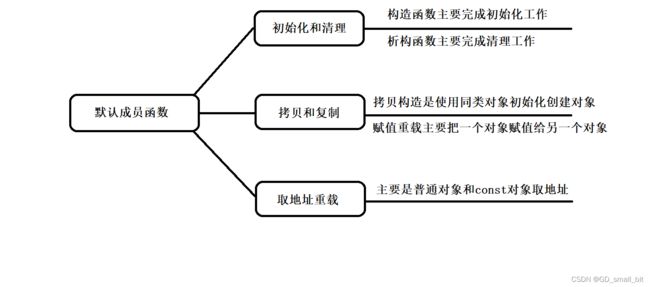类和对象(二)
今天,我带来类和对象的进阶篇。
目录
-
- 类的6个默认成员函数
- 默认成员函数的概念
- 构造函数
-
- 构造函数的概念
- 构造函数的特性
- 析构函数
-
- 析构函数的概念
- 析构函数的特性
- 拷贝构造函数
-
- 拷贝构造函数的概念
- 拷贝构造函数的特性
- 赋值运算符重载
-
- 运算符重载
- 赋值运算符重载
- 前置++和后置++重载
- const成员
- 取地址及const取地址操作符重载
类的6个默认成员函数
如果一个类中什么成员都没有,简称为空类。
空类中真的什么都没有吗?并不是,任何类在什么都不写时,编译器会自动生成以下6个默认成员函数。
默认成员函数的概念
默认成员函数:用户没有显式实现,编译器会生成的成员函数称为默认成员函数。
构造函数
构造函数的概念
构造函数是一个特殊的成员函数,名字与类名相同,创建类类型对象时由编译器自动调用,以保证每个数据成员都有 一个合适的初始值,并且在对象整个生命周期内只调用一次。
class Student
{
public:
Student(long long StudentNum,int weight,int height)
{
_StudentNum = StudentNum;
_weight = weight;
_height = height;
}
private: //成员变量一般设置为私有
long long _StudentNum;//学号
int _weight;//体重
int _height;//身高
};
int main()
{
Student* p = new Student(202212070065,135,179);//在实例化的时候,编辑器会自动调用构造函数,进行传参
return 0;
}
构造函数的特性
构造函数是特殊的成员函数,构造函数虽然名称叫构造,但是构造函数的主要任务并不是开空间创建对象,而是初始化对象。
其特征如下:
- 函数名与类名相同。
- 无返回值。
- 对象实例化时编译器自动调用对应的构造函数。
- 构造函数可以重载。
class Student
{
public:
Student()//无参构造函数
{}
Student(long long StudentNum,int weight,int height)//有参构造函数
{
_StudentNum = StudentNum;
_weight = weight;
_height = height;
}
private: //成员变量一般设置为私有
long long _StudentNum;//学号
int _weight;//体重
int _height;//身高
};
int main()
{
Student* p = new Student(202212070065,135,179);//在实例化的时候,编辑器会自动调用构造函数,进行传参
Student t;//调用无参构造
//Student c(); warning C4930: “Student c(void)”: 未调用原型函数(是否是有意用变量定义的?)
return 0;
}
注意:如果通过无参构造函数创建对象时,对象后面不用跟括号,否则就成了函数声明。
- 如果类中没有显式定义构造函数,则C++编译器会自动生成一个无参的默认构造函数,一旦用户显式定义编译器将不再生成。
class Student
{
public:
Student(long long StudentNum,int weight,int height)//有参构造函数
{
_StudentNum = StudentNum;
_weight = weight;
_height = height;
}
private: //成员变量一般设置为私有
long long _StudentNum;//学号
int _weight;//体重
int _height;//身高
};
int main()
{
Student t;//错误演示
return 0;
}

如果用户自己显式定义构造函数(不管是有参还是无参),那么编辑器就不会生成一个无参默认构造函数,而上面用户实现的是有参的构造函数,那么创建对象t时,就没有合适的默认构造函数去调用,导致报错。
- 关于编译器生成的默认成员函数,不实现构造函数的情况下,编译器会生成默认的构造函数。但是该生成的无参构造函数,没有对成员变量初始化,有什么作用呢?
解答:C++把类型分成内置类型(基本类型)和自定义类型。内置类型就是语言提供的数据类型,如:int/char…,自定义类型就是我们使用class/struct/union等自己定义的类型,编译器生成默认的构造函数会让自定义类型成员调用的它的构造函数。
#includeC++11 中针对内置类型成员不初始化的缺陷,打了补丁,即:内置类型成员变量在类中声明时可以给缺省值。
class Score
{
public:
Score()
{
cout << "Score 的构造函数被调用" << endl;
_Math = 0;
_English = 0;
}
private:
int _Math = 100;//内置类型在声明时给缺省值
int _English = 100;
};
int main()
{
Score p;
return 0;
}
- 无参的构造函数和全缺省的构造函数都称为默认构造函数,并且默认构造函数只能有一个。
注意:无参构造函数、全缺省构造函数、我们没写编译器默认生成的构造函数,都可以认为是默认构造函数。
class Date
{
public:
Date()
{
_year = 1900;
_month = 1;
_day = 1;
}
Date(int year = 1900, int month = 1, int day = 1)
{
_year = year;
_month = month;
_day = day;
}
private:
int _year;
int _month;
int _day;
};
// 以下测试函数能通过编译吗?
void Test()
{
Date d1;
}
int main()
{
Test();
return 0;
}

在写构造函数的时候,要防止默认构造函数冲突(即编辑器调用默认构造函数的时候出现了混乱)。
析构函数
析构函数的概念
析构函数:与构造函数功能相反,析构函数不是完成对对象本身的销毁,局部对象销毁工作是由编译器完成的。而对象在销毁时会自动调用析构函数,完成对象中资源的清理工作。
析构函数的特性
析构函数是特殊的成员函数,其特征如下:
- 析构函数名是在类名前加上字符 ~。
- 无参数无返回值类型。
- 一个类只能有一个析构函数。若未显式定义,系统会自动生成默认的析构函数。注意:析构函数不能重载
- 对象生命周期结束时,C++编译系统系统自动调用析构函数。
typedef int DataType;
class Stack
{
public:
Stack(size_t capacity = 3)//构造函数
{
_array = (DataType*)malloc(sizeof(DataType) * capacity);
if (NULL == _array)
{
perror("malloc申请空间失败!!!");
return;
}
_capacity = capacity;
_size = 0;
}
~Stack()//析构函数
{
if (_array)
{
free(_array);
_array = NULL;
_capacity = 0;
_size = 0;
}
}
private:
DataType* _array;
int _capacity;
int _size;
};
- 关于编译器自动生成的析构函数,也会调用自定义类型的析构函数。
#include
main方法中创建了Student对象p,而p中包含4个成员变量,其中_StudentNum、_weight、_height三个是内置类型成员,销毁时不需要资源清理,最后系统直接将其内存回收即可;
而_t是Score类对象,要将其内部包含Score类的_t对象销毁,要调用Score类的析构函数。
但是:main函数中不能直接调用Score类的析构函数,实际要释放的是Student类对象,所以编译器会调用Student类的析构函数,而Student没有显式提供,则编译器会给Date类生成一个默认的析构函数,目的是在其内部调用Score类的析构函数,即当Student对象销毁时,要保证其内部每个自定义对象都可以正确销毁。
main函数中并没有直接调用Score类析构函数,而是显式调用编译器为Student类生成的默认析构函数
总结:创建哪个类的对象则调用该类的构造函数,销毁那个类的对象则调用该类的析构函数。
- 如果类中没有申请资源时,析构函数可以不写,直接使用编译器生成的默认析构函数。
拷贝构造函数
拷贝构造函数的概念
拷贝构造函数:只有单个形参,该形参是对本类类型对象的引用(一般常用const修饰),在用已存在的类类型对象创建新对象时由编译器自动调用。
拷贝构造函数的特性
拷贝构造函数也是特殊的成员函数,其特征如下:
- 拷贝构造函数是构造函数的一个重载形式。
- 拷贝构造函数的参数只有一个且必须是类类型对象的引用,使用传值方式编译器直接报错,因为会引发无穷递归调用。
class Student
{
public:
Student(long long StudentNum, int weight, int height)
{
_StudentNum = StudentNum;
_weight = weight;
_height = height;
}
Student(Student stu)//报错
{
_StudentNum = stu._StudentNum;
_weight = stu._weight;
_height = stu._height;
}
private:
long long _StudentNum;//学号
int _weight;//体重
int _height;//身高
};
int main()
{
Student p(202212070065,130,180);
Student s(p);
return 0;
}

Student s(p),是用p对象去赋值给新创建的s对象,那么就要调用拷贝构造函数,在调用拷贝构造函数的时候,是传值给形参stu,所以要调用拷贝构造函数,调用拷贝构造函数,要传值给形参stu,传值给形参stu,要调用拷贝构造,一直循环下去。
- 若未显式定义,编译器会生成默认的拷贝构造函数。 默认的拷贝构造函数对象按内存存储按字节序完成拷贝,这种拷贝叫做浅拷贝,或者值拷贝。
注意:在编译器生成的默认拷贝构造函数中,内置类型是按照字节方式直接拷贝的,而自定义类型是调用其拷贝构造函数完成拷贝的。
- 类中如果没有涉及资源申请时,拷贝构造函数是否写都可以;一旦涉及到资源申请时,则拷贝构造函数是一定要写的,否则就是浅拷贝。
浅拷贝即只是将成员变量进行赋值,如下:
Student(Student stu)//报错
{
_StudentNum = stu._StudentNum;
_weight = stu._weight;
_height = stu._height;
}
但是,当出现指针,比如int* arr,开辟出一个数组,该数组的地址存到了arr里,如果只是浅拷贝,那么必然会有另外一个指针来接收这个地址,当解引用这个指针,存入数组时,都是往同一个数组存东西。
所以要有深拷贝的出现,即要重新开辟空间,拷贝原来数组空间里面的数据,而不是赋值地址过去就行。
- 拷贝构造函数典型调用场景:
使用已存在对象创建新对象
函数参数类型为类类型对象
函数返回值类型为类类型对象
为了提高程序效率,一般对象传参时,尽量使用引用类型,返回时根据实际场景,能用引用尽量使用引用。
赋值运算符重载
运算符重载
C++为了增强代码的可读性引入了运算符重载,运算符重载是具有特殊函数名的函数,也具有其返回值类型,函数名字以及参数列表,其返回值类型与参数列表与普通的函数类似。
函数名字为:关键字operator后面接需要重载的运算符符号。
函数原型:返回值类型 operator操作符(参数列表)
注意:
1.不能通过连接其他符号来创建新的操作符:比如operator@
2.重载操作符必须有一个类类型参数
3.用于内置类型的运算符,其含义不能改变,例如:内置的整型+,不能改变其含义
4.作为类成员函数重载时,其形参看起来比操作数数目少1,因为成员函数的第一个参数为隐藏的this指针。
5.
注意以上5个运算符不能重载。这个经常在笔试选择题中出
现。
class Student
{
public:
bool operator==(const Student& stu)
{
return _StudentNum == stu._StudentNum
&& _weight == stu._weight
&& _height == stu._height;
}
private:
long long _StudentNum;//学号
int _weight;//体重
int _height;//身高
};
在类中定义运算符重载函数,有this指针,而在类外面定义时,就没有this指针,写法有一些不同。
class Student
{
public:
long long _StudentNum;//学号
int _weight;//体重
int _height;//身高
};
bool operator==(const Student& s1,const Student& s2)
{
return s1._StudentNum == s2._StudentNum
&& s1._weight == s2._weight
&& s1._height == s2._height;
}
注意要把类中成员变量改为public,因为要在类外面可以访问。
赋值运算符重载
- 赋值运算符重载格式
(1)参数类型:const T&,传递引用可以提高传参效率
(2)返回值类型:T&,返回引用可以提高返回的效率,有返回值目的是为了支持连续赋值
(3)检测是否自己给自己赋值
(4)返回*this :要符合连续赋值的含义
class Student
{
public:
Student& operator=(const Student& stu)
{
if(this != &stu)//以防自己给自己赋值
{
_StudentNum = stu._StudentNum;
_weight = stu._weight;
_height = stu._height;
}
return *this;
}
private:
long long _StudentNum;//学号
int _weight;//体重
int _height;//身高
};
- 赋值运算符只能重载成类的成员函数不能重载成全局函数
原因:赋值运算符如果不显式实现,编译器会生成一个默认的。此时用户再在类外自己实现一个全局的赋值运算符重载,就和编译器在类中生成的默认赋值运算符重载冲突了,故赋值运算符重载只能是类的成员函数。
- 用户没有显式实现时,编译器会生成一个默认赋值运算符重载,以值的方式逐字节拷贝。注意:内置类型成员变量是直接赋值的,而自定义类型成员变量需要调用对应类的赋值运算符重载完成赋值。
注意:如果类中未涉及到资源管理,赋值运算符是否实现都可以;一旦涉及到资源管理则必须要实现。
前置++和后置++重载
前置++和后置++都是一元运算符,为了让前置++与后置++形成能正确重载,C++规定:后置++重载时多增加一个int类型的参数,但调用函数时该参数不用传递,编译器自动传递。
注意:后置++是先使用后+1,因此需要返回+1之前的旧值,故需在实现时需要先将this保存一份,然后给this+1。
const成员
将const修饰的“成员函数”称之为const成员函数,const修饰类成员函数,实际修饰该成员函数隐含的this指针,表明在该成员函数中不能对类的任何成员进行修改。
#include请思考下面的几个问题:
判断const指针和非const指针之间能否调用,可以采用权限缩小或者权限放大的方式去判断。
const指针,解引用后不可以修改,权限小。
非const指针,解引用后可以修改,权限大。
权限放大:const指针变成非const指针,不行。
权限缩小,非const指针变成const指针,行。
- const对象可以调用非const成员函数吗?
#include不行,报错。
原因:s是const对象,决定了调用Print函数时,传参的this指针是const类型的,而Print函数的接收this指针类型是非const的,权限放大,即原本解引用this指针的内容不可以修改,变成了可以修改,所以不行。
- 非const对象可以调用const成员函数吗?
#include运行成功,可以。
原因:s是非const对象,决定了调用Print函数,传参是非const,而成员函数Print的this指针类型是const,虽然类型不一致,但是是权限缩小,即原本可以修改this指针解引用的内容,变成了不可以修改,所以编辑器不会报错。
- const成员函数内可以调用其它的非const成员函数吗?
#include不行,权限放大。
- 非const成员函数内可以调用其它的const成员函数吗?
#include可以,权限缩小。
取地址及const取地址操作符重载
这两个默认成员函数一般不用重新定义 ,编译器默认会生成。
class Date
{
public:
Date* operator&()
{
return this;
}
const Date* operator&()const
{
return this;
}
private:
int _year; // 年
int _month; // 月
int _day; // 日
};
这两个运算符一般不需要重载,使用编译器生成的默认取地址的重载即可,只有特殊情况,才需要重载,比如想让别人获取到指定的内容!
现在,可以通过Date类,进行巩固以前的知识。
代码库




